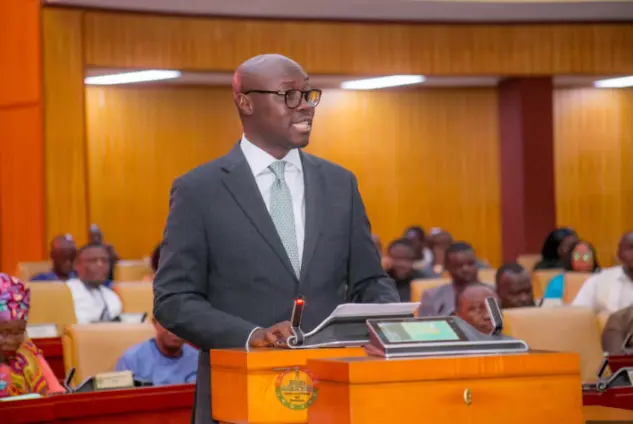Accusations and counter-accusations have flown thick and fast regarding the reasons behind Ghana’s recent macroeconomic stability. Former Finance Minister Dr. Mohammed Amin Adam, along with Dr. Muhamudu Bawumia, have suggested that the NPP’s strategic gold reserves are the primary driver. However, Isaac Adongo, a prominent economist, presents a contrasting view, one rooted in a detailed analysis of President Mahama’s economic policies. He questions the narrative that gold reserves alone are responsible for the improvements and aims to provide a fact-based perspective on what’s truly bolstering Ghana’s economic footing, especially focusing on the impact of President Mahama’s commitment to economic stability.
The core of Adongo’s argument revolves around critical questions that challenge the claims made by Bawumia and Amin.
Adongo directly addresses these claims, asserting that attributing the nation’s current economic stability to solely the NPP’s gold reserves is an oversimplification. He argues that the improved economic conditions are not the result of a single factor, but rather stem from a comprehensive economic strategy carefully orchestrated and implemented under President Mahama’s leadership.
President Mahama’s government, Adongo contends, has adopted a multi-faceted approach to ensure macroeconomic stability. This goes beyond relying on natural resources like gold and involves a more complex and nuanced strategy.
This includes fiscal discipline, effective monetary policy implementation, and strategic economic interventions. According to Adongo, “The stability of the cedi reflects President Mahama’s government’s commitment to fiscal discipline…”
Adongo also highlights the crucial role played by the Bank of Ghana. The central bank’s monetary policy, encompassing interest rate decisions and liquidity management, has been instrumental in stabilizing the economy and fostering a more predictable economic environment.
Furthermore, the innovative GoldBod program, leveraging Ghana’s natural resources to support the currency, is a key component of the strategy. According to Adongo, this initiative has been carefully implemented with attention to market dynamics, ensuring its effectiveness in stabilizing the cedi.
The declining inflation rate is another significant indicator of the effectiveness of the government’s comprehensive anti-inflationary measures. Strategic interventions in food supply chains and energy markets have directly addressed cost-push factors, contributing to a more stable and predictable price environment. Moreover, growing investor confidence in President Mahama’s leadership has increased funding commitments to the economy, a stark contrast to the divestments experienced under the previous administration.
Several key policy changes have underpinned the recent economic improvements. Fiscal consolidation efforts have reduced the government’s reliance on domestic borrowing, freeing up credit for the private sector and easing the crowding-out effect. The government is also committed to structural economic reforms in crucial sectors such as energy, public financial management, and state-owned enterprises. The launch of the Code of Conduct for appointees is a confidence booster, assuring investors of ethical governance and responsible economic stewardship.
Ghana’s traditional export sectors, particularly gold and cocoa, have demonstrated resilience and growth. The GoldBod program has played a significant role in curbing gold smuggling, leading to increased export revenues and a more stable foreign exchange market. The Bank of Ghana has enhanced transparency in its foreign exchange operations through regular publications and clear communication. The Monetary Policy Committee has injected credibility through pre-meeting conferences and publication of voting decisions.
The progress made under President Mahama’s leadership has also garnered recognition from international bodies such as the IMF, World Bank, and various rating agencies. S&P Global Ratings, for instance, raised Ghana’s long- and short-term foreign currency sovereign credit ratings to ‘CCC+/C’ from ‘SD/SD’. This reflects growing confidence in the country’s economic trajectory, declining debt metrics, and a clear path to debt sustainability. This upgrade has reduced the risk premium on government treasuries, lowering borrowing costs and making it easier for the government to finance its development initiatives.
Ultimately, the unprecedented stability in the cedi and the normalisation of the yield curve are helping anchor disinflation. These positive developments are beginning to translate into lower prices for ordinary Ghanaians, fulfilling President Mahama’s campaign promises and demonstrating the tangible benefits of his economic policies.
In conclusion, Adongo’s analysis challenges the narrative put forth by the NPP, asserting that their policies are solely responsible for Ghana’s current economic stability. He emphasizes that external factors, previously blamed for the nation’s economic challenges, persist, yet positive trends are emerging under President Mahama’s leadership. This underscores the importance of effective leadership and comprehensive strategies in achieving sustainable economic solutions, rather than relying on short-sighted measures. President Mahama, according to Adongo, is delivering on his pledge to the Ghanaian people, focusing on building a strong and resilient economy for the long term.
Image Source: MYJOYONLINE






















